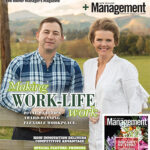Service is key in the executive taxi industry
Communication, building relationships and going the extra mile are the keys in any service business. It is no different at the executive end of the increasingly disrupted taxi industry. “Treating […]
Communication, building relationships and going the extra mile are the keys in any service business. It is no different at the executive end of the increasingly disrupted taxi industry.
“Treating people, the way you would like to be treated – with respect and kindness is key,” says Paul de Abaitua, one of the 350 Corporate Cabs owner drivers in Auckland, Wellington, Christchurch, Dunedin and the Queenstown region.
While Uber and other ride sharing alternatives are disrupting the main stream taxi market, Corporate Cabs is continuing to grow, based on its core business model of providing a quality service to corporate clients.
The service aspect can not be under stated says Paul, who was an engineer, before he decided he wanted the opportunity to meet a variety of professional people in a new career.
“You need to know where you are going and not just rely on GPS. Arrive early for pick-ups and let the client know you’re there.”
Corporate Cabs has under gone a transformation recently with a new business model for its owner operators.
The Holden Statesman and Calais models which were the back bone of the fleet for more than 25 years are being replaced by the Skoda Superb – yes, they are really called that – which has been given the added “Corporate” moniker to denote the unique specification the cars are supplied in to meet the requirements of the job.
“They’re more comfortable, more economical, a better drive and offer more space for clients and their luggage,” says Paul.
Having quality vehicles and providing a professional service gives Corporate Cabs owner operators the ability to earn a higher level of income than the industry average says Colin Samson, the company’s chief executive.
“Up to 80 percent of the journeys are pre booked, creating a safe and reliable working environment for our drivers.”
A new business model now gives franchisees a share of
gross revenue rather than the industry standard levy and administrative fee. “Our owner operators can earn more, as the percentage charged decreases as the turnover increases, so the more the owner operators earn, the greater the share they receive.” says Colin.
As corporate accounts are handled through Corporate Cabs, individual owner operators are guaranteed weekly payments the following week, which improves cashflow.
Owner operators are encouraged to take on a second driver who can operate the Skoda Superb Corporate during their own down time to increase their income. Both owner operators and drivers have to under take the same customer service training.
Many owner operators are now making over $100,000 a year he says and with two drivers more than $175,000 a year is possible. “It’s not all profit, but it can provide a comfortable income,” says Colin.
Prospective owner drivers can join Corporate Cabs from as little as $20,000, including the leased vehicle, training and uniform, equipment and signage.
“Our finance team sits down with all potential franchisees to help them gain a complete understanding of the business.”
Paul de Abaitua does not regret his decision to spend his working day on the road. “I’ve met some interesting people. I spent two days with the Lord Mayor of London. In the last financial year, I turned over $120,000 in ten months.”


